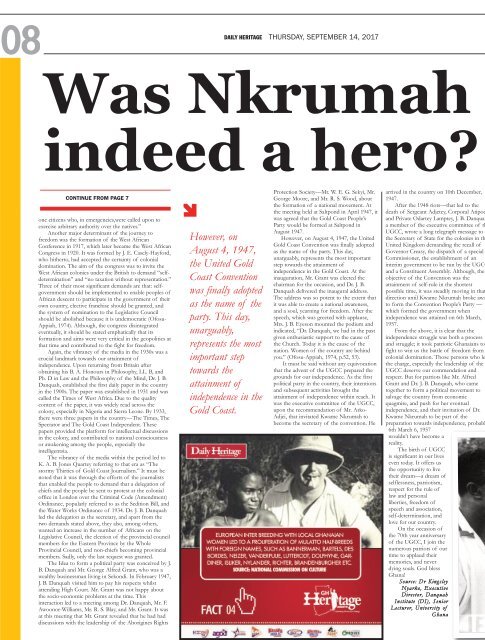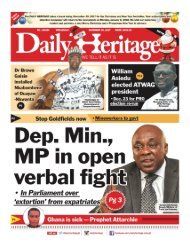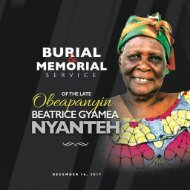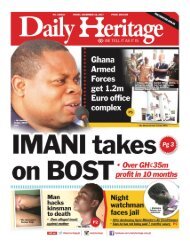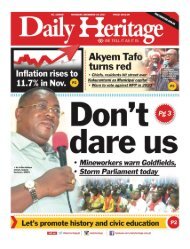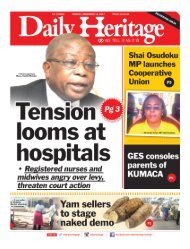Daily Heritage September 14
Create successful ePaper yourself
Turn your PDF publications into a flip-book with our unique Google optimized e-Paper software.
-<br />
DAILY HERITAGE THURSDAY, SEPTEMBER <strong>14</strong>, 2017<br />
GH <strong>Heritage</strong> Month Series<br />
Was Nkrumah<br />
indeed a hero?<br />
CONTINUE FROM PAGE 7<br />
one citizens who, in emergencies,were called upon to<br />
exercise arbitrary authority over the natives.”<br />
Another major determinant of the journey to<br />
freedom was the formation of the West African<br />
Conference in 1917, which later became the West African<br />
Congress in 1920. It was formed by J. E. Casely-Hayford,<br />
who hitherto, had accepted the certainty of colonial<br />
domination. The aim of the congress was to invite the<br />
West African colonies under the British to demand “selfdetermination”<br />
and “no taxation without representation.”<br />
Three of their most significant demands are that: selfgovernment<br />
should be implemented to enable peoples of<br />
African descent to participate in the government of their<br />
own country, elective franchise should be granted, and<br />
the system of nomination to the Legislative Council<br />
should be abolished because it is undemocratic (Ofosu-<br />
Appiah, 1974). Although, the congress disintegrated<br />
eventually, it should be stated emphatically that its<br />
formation and aims were very critical in the geopolitics at<br />
that time and contributed to the fight for freedom.<br />
Again, the vibrancy of the media in the 1930s was a<br />
crucial landmark towards our attainment of<br />
independence. Upon returning from Britain after<br />
obtaining his B. A. Honours in Philosophy, LL. B, and<br />
Ph. D in Law and the Philosophy of the Mind, Dr. J. B.<br />
Danquah, established the first daily paper in the country<br />
in the 1900s. The paper was established in 1931 and was<br />
called the Times of West Africa. Due to the quality<br />
content of the paper, it was widely read across the<br />
colony, especially in Nigeria and Sierra Leone. By 1933,<br />
there were three papers in the country—The Times, The<br />
Spectator and The Gold Coast Independent. These<br />
papers provided the platform for intellectual discussions<br />
in the colony, and contributed to national consciousness<br />
or awakening among the people, especially the<br />
intelligentsia.<br />
The vibrancy of the media within the period led to<br />
K. A. B. Jones Quartey referring to that era as “The<br />
stormy Thirties of Gold Coast Journalism.” It must be<br />
noted that it was through the efforts of the journalists<br />
that enabled the people to demand that a delegation of<br />
chiefs and the people be sent to protest at the colonial<br />
office in London over the Criminal Code (Amendment)<br />
Ordinance, popularly referred to as the Sedition Bill, and<br />
the Water Works Ordinance of 1934. Dr. J. B. Danquah<br />
led the delegation as the secretary, and apart from the<br />
two demands stated above, they also, among others,<br />
wanted an increase in the number of Africans on the<br />
Legislative Council, the election of the provincial council<br />
members for the Eastern Province by the Whole<br />
Provincial Council, and non-chiefs becoming provincial<br />
members. Sadly, only the last request was granted.<br />
The Idea to form a political party was conceived by J.<br />
B. Danquah and Mr. George Alfred Grant, who was a<br />
wealthy businessman living in Sekondi. In February 1947,<br />
J. B. Danquah visited him to pay his respects whilst<br />
attending High Court. Mr. Grant was not happy about<br />
the socio-economic problems at the time. This<br />
interaction led to a meeting among Dr. Danquah, Mr. F.<br />
Awoonor-Williams, Mr. R. S. Blay, and Mr. Grant. It was<br />
at this meeting that Mr. Grant revealed that he had had<br />
discussions with the leadership of the Aborigines Rights<br />
However, on<br />
August 4, 1947,<br />
the United Gold<br />
Coast Convention<br />
was finally adopted<br />
as the name of the<br />
party. This day,<br />
unarguably,<br />
represents the most<br />
important step<br />
towards the<br />
attainment of<br />
independence in the<br />
Gold Coast.<br />
Protection Society—Mr. W. E. G. Sekyi, Mr.<br />
George Moore, and Mr. R. S. Wood, about<br />
the formation of a national movement. At<br />
the meeting held at Saltpond in April 1947, it<br />
was agreed that the Gold Coast People’s<br />
Party would be formed at Saltpond in<br />
August 1947.<br />
However, on August 4, 1947, the United<br />
Gold Coast Convention was finally adopted<br />
as the name of the party. This day,<br />
unarguably, represents the most important<br />
step towards the attainment of<br />
independence in the Gold Coast. At the<br />
inauguration, Mr. Grant was elected the<br />
chairman for the occasion, and Dr. J. B.<br />
Danquah delivered the inaugural address.<br />
The address was so potent to the extent that<br />
it was able to create a national awareness,<br />
and a soul, yearning for freedom. After the<br />
speech, which was greeted with applause,<br />
Mrs. J. B. Eyeson mounted the podium and<br />
indicated, “Dr. Danquah, we had in the past<br />
given enthusiastic support to the cause of<br />
the Church. Today it is the cause of the<br />
nation. Women of the country are behind<br />
you.” (Ofosu-Appiah, 1974, p.52, 53).<br />
It must be said without any equivocation<br />
that the advent of the UGCC prepared the<br />
grounds for our independence. As the first<br />
political party in the country, their intentions<br />
and subsequent activities brought the<br />
attainment of independence within reach. It<br />
was the executive committee of the UGCC,<br />
upon the recommendation of Mr. Arko-<br />
Adjei, that invitated Kwame Nkrumah to<br />
become the secretary of the convention. He<br />
arrived in the country on 10th December,<br />
1947.<br />
After the 1948 riots—that led to the<br />
death of Sergeant Adjetey, Corporal Atipoe,<br />
and Private Odartey Lamptey, J. B. Danquah,<br />
a member of the executive committee of the<br />
UGCC, wrote a long telegraph message to<br />
the Secretary of State for the colonies in the<br />
United Kingdom demanding the recall of<br />
Governor Creasy, the dispatch of a special<br />
Commissioner, the establishment of an<br />
interim government to be run by the UGCC,<br />
and a Constituent Assembly. Although, the<br />
objective of the Convention was the<br />
attainment of self-rule in the shortest<br />
possible time, it was steadily moving in that<br />
direction until Kwame Nkrumah broke away<br />
to form the Convention People’s Party —<br />
which formed the government when<br />
independence was attained on 6th March,<br />
1957.<br />
From the above, it is clear that the<br />
independence struggle was both a process<br />
and struggle; it took patriotic Ghanaians to<br />
fight to win us the battle of freedom from<br />
colonial domination. Those persons who led<br />
the charge, especially the leadership of the<br />
UGCC deserve our commendation and<br />
respect. But for patriots like Mr. Alfred<br />
Grant and Dr. J. B. Danquah, who came<br />
together to form a political movement to<br />
salvage the country from economic<br />
quagmire, and push for her eventual<br />
independence, and their invitation of Dr.<br />
Kwame Nkrumah to be part of the<br />
preparation towards independence, probably,<br />
6th March 6, 1957<br />
wouldn’t have become a<br />
reality.<br />
The birth of UGCC<br />
is significant in our lives<br />
even today. It offers us<br />
the opportunity to live<br />
their dream—a dream of<br />
selflessness, patriotism,<br />
respect for the rule of<br />
law and personal<br />
liberties, freedom of<br />
speech and association,<br />
self-determination, and<br />
love for our country.<br />
On the occasion of<br />
the 70th year anniversary<br />
of the UGCC, I join the<br />
numerous patriots of our<br />
time to applaud their<br />
memories, and never<br />
dying souls. God bless<br />
Ghana!<br />
Source: Dr Kingsley<br />
Nyarko, Executive<br />
Director, Danquah<br />
Institute (DI), Senior<br />
Lectur er, University of<br />
Ghana<br />
BY PROF. AGYEMAN BADU AKOSA,<br />
AVOWED NKRUMAIST<br />
• Dr K.A Busia<br />
REHABILITATION<br />
OF OSAGYEFO DR<br />
KWAME NKRUMAH<br />
IS INCOMPLETE<br />
GHANA'S DAY of shame, February 24, 1966, was<br />
followed by an avalanche of well-orchestrated falsehoods to<br />
attempt to justify the dastardly deed and demean the<br />
independence of the nation. The struggle was pivoted on the<br />
declaration of positive action which gave Ghanaians the<br />
opportunity to show their abhorrence for the system of<br />
colonialism.<br />
That was the point of separation between those who<br />
were prepared to stand up to be counted and those whose<br />
brief was incremental participation in the governance by the<br />
Governor and his cohort of collaborators and compradors.<br />
Falsehoods<br />
The falsehoods included Nkrumah taking gold bars to<br />
Egypt for Madam Fathia, looting the nation's coffers,<br />
• Dr Kwame Nkrumah excited at a CPP event<br />
consulting 'Kankan Nyame' and the practice of occultism,<br />
killing Ghanaians and throwing them to the lions in the<br />
Flagstaff House zoo and so many others.<br />
The reality of the situation was that there were no gold<br />
bars in Egypt and poor Madam Fathia struggled beyond<br />
recognition in her life thereafter. It is public knowledge now<br />
that Nkrumah died with not even a plot of land to his name.<br />
It is worth mentioning that the land on which the Peduase<br />
Lodge is built was a gift to him and members of the<br />
Convention People's Party contributed to the start of the<br />
building for him but he characteristically was to give the<br />
building to the state as Ghana's Camp David.<br />
The fertile figment of his detractors' imagination<br />
conjured many images of Nkrumah that was to make many<br />
Ghanaians form a damaging impression of the man who<br />
liberated them. The Ghanatta cartoon series were to cast a<br />
very critical and psychologically damaging picture of<br />
Nkrumah and yet he was a disciple of theology and a<br />
practising human-centered individual who cared for<br />
Ghanaians beyond measure.<br />
His government's chief pride was the welfare of the<br />
people and at every turn he told Ghanaians he would work<br />
hard to abolish poverty, ignorance and disease. 'Kankan<br />
Nyame' existed as a fetish shrine in Guinea but Nkrumah did<br />
not consult it.<br />
It is, however, a shame that Ghanatta has died not<br />
apologising to the country for misleading Ghanaians.<br />
Recognition and rehabilitation<br />
In 2007, when Ghana hosted the AU and chose not to<br />
have any campaign for the position of continental unity, His<br />
Excellency Alpha Konare, Chairman of the AU, clearly stated<br />
that Africa had not begun to honour Dr Kwame Nkrumah.<br />
The establishment of the Founder's Day holiday in<br />
Ghana and the continent-wide recognition has been<br />
heartwarming and a good redeeming start.<br />
Nkrumah staked his leadership on achieving the unity of<br />
Africa and everything on achieving the unity of Africa and<br />
everything he predicted would happen if we failed to unite<br />
has come to pass. Africa, with 60 per cent of the world's<br />
natural resources, controls only about one per cent of the<br />
world' money.<br />
The Statistics continue to be gloomy and yet the rich<br />
nations continue to exploit our lack of unity to plunder our<br />
resources under the guise of the latter day neo-colonialism<br />
and imperialism agenda called globalization. The celebration<br />
of the centenary of his birth was cleverly divided into three<br />
by the Centenary Planning Committee made up of upright<br />
Nkrumaist eminent men and women who believed in the<br />
ideals of Nkrumah.<br />
The birthday cluster in <strong>September</strong> 2009, the<br />
independence cluster in March 2010 and the African Union<br />
(AU) cluster in May 2010. The divisions recognised the man<br />
and his achievements.<br />
The high level participation of the<br />
African Union in the AU cluster in May<br />
2010 was commendable. The celebrations<br />
have gone a long way to correct a great<br />
wrong and rehabilitate Nkrumah in the<br />
public domain. Many who did not know<br />
him or of him have now heard about the<br />
man. Many who knew him but had<br />
forgotten have been reminded and even<br />
those who knew and had heard but did<br />
not wish to acknowledge have been reeducated.<br />
The colloquium organized as<br />
part of the AU cluster with speakers<br />
from Ghana, the rest of Africa and<br />
Ghana's eleventh region, the Diaspora,<br />
demonstrated the man as an academic,<br />
philosopher par excellence, original<br />
thinker, emancipator of the black race<br />
and a man who could be bound by the<br />
history of time.<br />
His ideas are even more relevant in<br />
Ghana and Africa today than probably<br />
during the period under his leadership.<br />
The re-naming of Kwame Nkrumah<br />
University of Science and Technology<br />
(KNUST) must also be commended. It is<br />
interesting to note that the old students<br />
of Nsein Secondary School want the<br />
school name to revert to Kwame<br />
Nkrumah Secondary School.<br />
The University of Cape Coast has<br />
instituted Kwame Nkrumah Memorial<br />
Lectures, which straddles his birth date.<br />
The 2010 lectures began from Monday, <strong>September</strong> 20, for<br />
three days ending on Wednesday, <strong>September</strong> 22, 2010.<br />
KNUST unveiled Dr Nkrumah’s statues to his everlasting<br />
memory. The University of Ghana has invested the Kwame<br />
Nkrumah Chair of African Studies and the Academy of Arts<br />
and Science organizers an annual Founder's Day week, which<br />
includes the Kwame Nkrumah Memorial Lecture and the<br />
author delivered the centenary year lecture on 'Ghana the<br />
house Nkrumah built'. Incidentally, for those who do not<br />
know, the Academy was founded by Dr. Kwame Nkrumah.<br />
What does the University of Education, Winneba, University<br />
of Development Studies, Tamale and the University of<br />
Mines and Technology, Tarkwa intend to do for the memory<br />
of Dr. Kwame Nkrumah, since all their antecedent<br />
institutions were established by him. What has the Ghana<br />
Institute of Management and Public Administration done or<br />
intend to do?<br />
This institute was also established by Osagyefo Dr.<br />
Kwame Nkrumah. Then there are the many other<br />
organizations such as Bank of Ghana, which has created the<br />
new Ghana two Cedis to immortalize him but what about<br />
State Insurance Company. Social Security and National<br />
Insurance Trust, Ghana Commercial Bank, Agricultural<br />
Development Bank, National Investment Bank, Telecom.<br />
Ghana Post, COCOBOD, Produce Buying Agency, Cocoa<br />
Processing Company, Ghana Ports and Harbour authority,<br />
Dry Docks, GOIL, BOST and all the many organisations he<br />
founded which have provided many jobs for people some of<br />
whom do not even believe he is worth the recognition.<br />
All these organisations must come together to set up the<br />
Kwame Nkrumah Memorial Fund that can support the many<br />
needy but brilliant children through junior high and senior<br />
high schools and also through university. It can be done and<br />
we look forward to hearing the announcement.<br />
President John Evans Atta Mills demonstrated his<br />
Nkrumaist credentials by the bold decision to create the<br />
Founder's Day and also celebrate the centenary of his birth.<br />
However, the continued glorification of the man paid by<br />
the Central Intelligence Agency of United States of America<br />
and M16 of Britain to overthrow the democratically elected<br />
Government of Ghana and halt Ghana and Africa's forward<br />
match leaves a lot to be desired and cannot be condoned.<br />
Why on earth have successive governments of this country<br />
shied away from taking the bold decision to change the name<br />
of the international airport?<br />
There was no way the Busia government was going to do<br />
anything about it. As accomplices to the coup d'etat and<br />
political advisor to the Military government of the National<br />
Liberation Council, they were at home.<br />
Surprisingly the Acheampong military government, who,<br />
we are told, were sympathetic to Nkrumah, did not do it<br />
either. Maybe their military instinct took the better part of<br />
them. The part that baffles me more than any other is why<br />
the Limann government did not change the name of the<br />
main entry into Ghana.. I do not think they needed more<br />
than twenty four hours to effect that change.<br />
Twenty seven months later, the soldiers were out of<br />
government but the name of Ghana's only international<br />
airport continues to bear the name of the usurper Kotoka. It<br />
did not surprise me that the Kufuor government did not do<br />
anything about it. It was, however, represented by the<br />
Deputy Attorney General at the unveiling of the statue of<br />
Kotoka at Atimpoku to add further insult to Ghana's already<br />
festering injury.<br />
They [those opposed to Nkrumah] revel in it and<br />
unashamedly as a tradition that demonstrates their<br />
generational hatred for Dr Kwame Nkrumah in so many<br />
ways. Our democracy has come to stay and our democratic<br />
credentials are enviable. The smooth transition from one<br />
political party to another has very well been received by the<br />
world at large.<br />
We therefore cannot continue to revere people who took<br />
the people of this country to ransom and brought an end to<br />
self-determination, self-reliance and pan-Africanism and the<br />
fight for continental unity but deepened our dependency.<br />
The rehabilitation of Osagyefo Dr Kwame Nkrumah is<br />
surely incomplete with our airport remaining Kotoka<br />
International Airport .<br />
Even if Ghana chooses not to name the airport after<br />
Osagyefo Dr. Kwame Nkrumah, it must be named Accra<br />
International Airport. The country must not give any<br />
comfort to those who, through the barrel of the gun, have<br />
held this country and all in it hostage; promised liberation,<br />
redemption and revolutionary heroics all to no avail. We<br />
must march forward recognizing those who genuinely<br />
sacrificed to get us free. Freedom!


